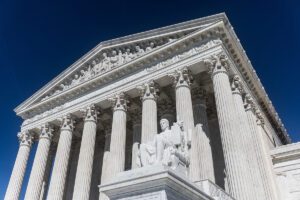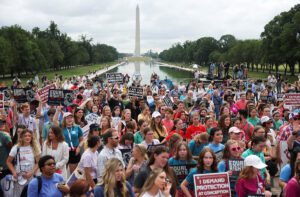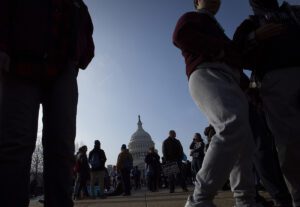WASHINGTON (OSV News) – The Supreme Court’s new term begins Oct. 2, and on its docket will be legal challenges concerning both the First and Second Amendments, as well as potentially other related major cases.
Texas and Florida both have passed laws designed to combat what they alleged were social media companies’ content policies that disproportionately restricted conservatives through what critics called censoring, shadow-banning or de-platforming. Those laws are currently blocked from enforcement while the court considers the matter.

Among controversies over such allegations includes an effort by social media companies to reduce the spread of inaccurate information about the COVID-19 pandemic or COVID-19 vaccines.
John Bursch, senior counsel and vice president of appellate advocacy at Alliance Defending Freedom, told OSV News the group is interested in O’Connor-Ratcliff v. Garnier and Lindke v. Freed, the cases concerning social media accounts.
“This is an important pair of cases for the court to get right to make sure that everybody is able to freely participate in public debate,” he said.
In United States v. Rahimi, the justices will consider a challenge to the constitutionality of a federal ban on the possession of firearms by those who are under domestic violence restraining orders.
A federal law enacted in 1994 prohibits those subject to domestic violence restraining orders from possessing firearms. The case concerns Zackey Rahimi, a Texas man who was placed under a restraining order after assaulting his girlfriend in 2019 and threatening to shoot her. Rahimi later took part in crimes and was involved in five shootings, after which authorities searched his home and charged him with violating that federal ban.
But after the Supreme Court’s June 2022 decision in New York State Rifle & Pistol Association v. Bruen, striking down part of New York’s handgun-licensing law, an appeals court threw out Rahimi’s conviction, arguing Rahimi still had the right to bear arms under the Second Amendment per that case.
The Supreme Court may also choose to take up a case concerning a challenge brought by a coalition of pro-life opponents of mifepristone, the first of two drugs used in a medication or chemical abortion. The coalition challenged the U.S. Food and Drug Administration’s approval of that drug, arguing the FDA violated its own safety standards when it first authorized the drug’s use for abortion in 2000. The Justice Department and the manufacturer of mifepristone have asked the high court to take up that case.
ADF is representing the pro-life coalition in that case.
Speaking broadly on cases the group is watching, Bursch said, “the court has been very protective of free speech and free exercise rights over the last decade and a half roughly.”
He said there are “definitely more possibilities to move the law in that area and protect people’s ability to live their faith in the public square.”
Other potential cases the court may add to its docket include a federal ban on machine guns applied to bump stocks, or devices that allow semiautomatic weapons to rapidly fire multiple rounds, and school bans on students who identify as transgender using bathrooms not consistent with their biological sex.
Becket, a Washington-based religious liberty law firm, has also asked the Supreme Court to take up Vitagliano v. County of Westchester, concerning Debra Vitagliano, a Catholic sidewalk counselor challenging a New York county law prohibiting pro-life protesters from approaching people outside abortion clinics.
Her case seeks the high court to review its 2000 ruling in Hill v. Colorado, which involved a Colorado law enacted in 1993. That law regulated First Amendment activity within 100 feet of an entrance to any health care facility and prohibited approaching a person within eight feet without their consent to provide any protest materials or counseling.
“Religious liberty and free speech are central to our ability to live together in peace,” Mark Rienzi, president and CEO at Becket, said in a statement about cases the group is seeking to be considered this term. “The Court has an important role to play in protecting the First Amendment rights for people of all faiths.”



